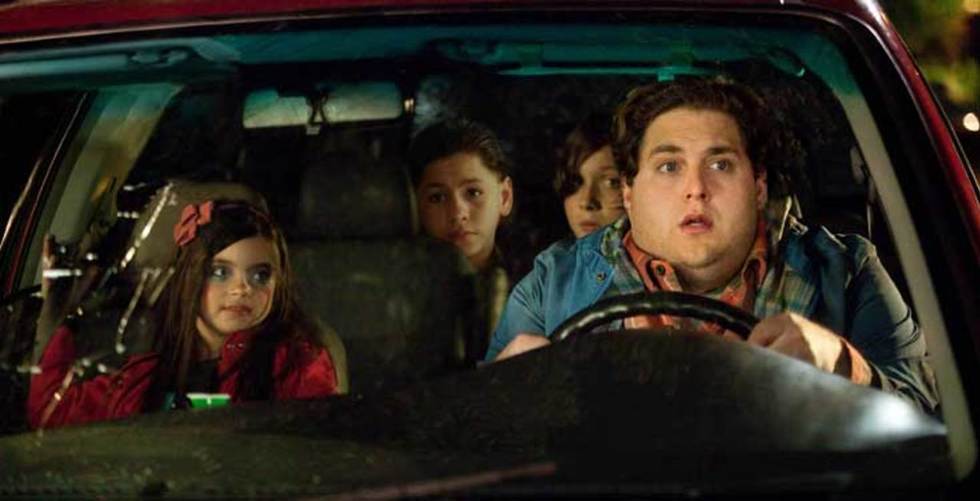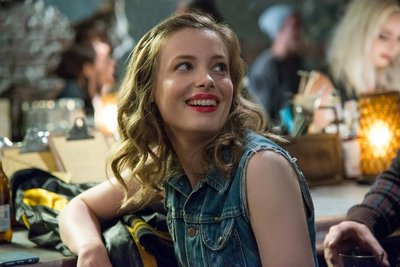
BY ADAM SCHARTOFF |
Totally Rad: David Gordon Green Talks Movies & 80s Nostalgia
The indie auteur-turned-mainstream comedy guru discusses the 80s nostalgia that helped shaped The Sitter.


Photo courtesy 20th Century Fox/ credit: Jessica Miglio
David Gordon Green loves talking about movies. He loves watching movies too. Most of all, Green loves making them. That wasn’t always the case. After 4 critically acclaimed indie films, which included George Washington (2000), All The Real Girls (2003), Undertow (2004), and Snow Angels (2008), Green grew tired of having to kill himself for financing only to have minuscule audiences see his films.
After making Snow Angels, starring Sam Rockwell—who would also play a role in The Sitter—Green found himself hanging out on the set of Knocked Up and becoming chummy with Judd Apatow and company. Running with that crowd resulted in a major change in his storytelling approach, and the first product of the new Green wave was Pineapple Express (2008), a mainstream comedy starring James Franco and Seth Rogen. That movie’s success paid for Your Highness (2011), which was a commercial flop. But Green, ever determined, decided to tap his recent friendship with Jonah Hill and make The Sitter, a comedy about a most unlikely sitter and a night gone terribly awry. The movie is a rollicking homage to the 80s John Hughes genre of wacky family movies.
In what is becoming typical of a David Gordon Green experience, The Sitter opened at number 2 this weekend—a good thing by all accounts—but on the most abysmal box office weekend in 3 years. But after meeting and chatting with Green, who preferred to discuss his curating of his favorite 80s movies for BAM’s Cinema Club (in which he serves as Chair), it’s unlikely that this will deter him from making whatever his next project he has in the works.
Tribeca spoke with David Gordon Green on the phone the day only hours after he had introduced The Sitter in a sneak preview to sold out audience at BAM.
Tribeca: This week you’ve curated some of your favorite 80s movies for a series at BAM. What went into your choices?
David Gordon Green: Well, we know everyone wants to see After Hours and Something Wild, but there’s not a lot of appreciation these days for those 80s movies. There’s got to be a new appreciation for movies like Adventures in Babysitting and Uncle Buck. Those are the... what do you call those movies? The Wild Dogs of cinema?
Tribeca: I noticed you didn’t include any of the Look Who’s Talking movies among your choices.
DGG: I do like Look Who’s Talking Too. Any movie that has ‘Too’ in a sequel’s title, like The Jerk, Too... it’s usually a follow up to a masterpiece. I’m kind of intrigued by it. But I was not as big a fan of the original Look Who’s Talking as I was of the second. I didn’t even look at Look Who’s Talking Now because I think that one had animals.
Tribeca: Dogs.
DGG: Talking animals goes against my ethics.

Photo courtesy 20th Century Fox/ credit: Jessica Miglio
Tribeca: You did take some inspiration from those films with The Sitter, at least in terms of the precocious child cliché, and decided to run with it. In other words, you turned some old clichés on their head.
DGG: That’s my hope, because there’s a lot of movies about the unlikely caretaker of kids. There’s Daddy Day Care. I think there was a sequel called Daddy Day Camp with Cuba Gooding, Jr. There’s The Pacifier. I wanted to make a movie that was a family movie that you couldn’t take the kids to see.
Tribeca: It’s a rule that you have to cast against type, correct? In The Pacifier, you had Vin Diesel, and there was Arnold Schwarzenegger in Kindergarten Cop.
DGG: Yeah, there’s quite a few movies about the guy who you don’t want taking care of your kids. But The Sitter is about the guy you really don’t want babysitting your kids.
Tribeca: Well, it’s all the more funny because in this the kids might be worse than the babysitter.
DGG: In a lot of ways. Here they end up having an impact on each others’ lives. Just in time for the heartwarming finale.
Tribeca: Yes, it was like when Daniel Stern, Joe Pesci and Macauley Culkin all came together.
DGG: Oh my God, yes. So we definitely wanted to take those clichés and turn them on their head. And, as you mentioned, some of that is also done in the casting and by not casting sitcom kids or the smiling cliché villains.
Tribeca: Did you see Drive yet?
DGG: Best movie of the year, yeah.
Tribeca: Because it referenced those 80s Michael Mann movies like Manhunter.
DGG: The titles and music in Drive are perfect. It’s the only soundtrack I’ve bought this year. Actually, not true, I bought Tron: Legacy too.
Tribeca: Speaking of Tron, that reminds me of Hal Ashby’s classic 80s movie, 8 Million Ways to Die. BAM had a Hal Ashby retrospective recently, and the only 2 movies I went to were his 80s movies. Well, I saw The Landlord too with Beau Bridges. It was great seeing it on the big screen. And then to have Robert Downey, Sr. come out and do the Q&A was great.
DGG: That’s amazing. They should show his movies too, like Greaser’s Palace and Putney Swope.
Tribeca: Unless I’m mistaken, Criterion is finally re-issuing his movies.
DGG: Yeah, for a while you could get them on DVD and now you can’t any more.
Tribeca: Okay, now to the topic everyone is mandated to bring up. I can see your eyes rolling to the back of your head already. You were making these intimate independent dramas for years, and then in 2008 you changed course and started making commercial comedies. Was the first period the years reflecting back at your childhood?
DGG: Well, all my movies reference my youth, arguably. I’m sort of stuck in my childhood. The guy in his 30s who won’t grow up. Those earlier films explore my childhood and teen years. They are reflective of my vulnerabilities and relationships.
Tribeca: You’re a southern boy. Many people think of southern literature when they refer to American literature. Did reading those books inspire you?
DGG: I was definitely inspired by the books I was reading at the time, from Huckleberry Finn to Night of the Hunter. And what’s great about good movies adapted from literature, like True Grit, is that it introduces a writer like Charles Portis to a new generation of people. They’re entertained by something commercially successful, and whether you’re a studio executive or a ticket buyer, it introduces you to a whole new world of things to appreciate.

Photo courtesy 20th Century Fox/ credit: Jessica Miglio
Tribeca: What inspired the more recent movies of yours?
DGG: Snow Angels was definitely influenced by these stories that were “torn from the headlines,” dramatic incidents that really affected me. I sort of woke up to the harsh realities of where I was living and what was happening around me at the time. Then Pineapple Express is a reference to the buddy/action movies from the 80s like Tango & Cash and 48 Hrs. Running Scared is another, the Billy Crystal/Gregory Hines version. Your Highness was supposed to be the movie that was taboo and forbidden for me to see in my youth, like The Sword and The Sorcerer: the rated R sorcerer films that were out of time. The Sitter is a result of my enthusiasm for those John Hughes movies.
Tribeca: Then is it fair to say that your earlier films were made from a filmmaker’s perspective and the more recent movies were from a film lover’s?
DGG: That’s a positive way to look at it. I like that. For years, you're really inspired by filmmakers—when you come out of film school and you have an intellectual perspective on filmmakers. So you watch a lot of Peckinpah and you do your homework on Bertolucci. I think over time, you find you want to make something artful and emotional, and then other times you hire your friends and loosen up.
Tribeca: And I’m sure that can also be quite emotionally gratifying.
DGG: Absolutely. As an audience member, you don’t always want to see something intellectual or pretentious every night of the week. You want to shake things up every once in a while. Enjoy a guilty pleasure now and then.
The Sitter is currently playing in many theaters near you.
Check in to The Sitter on Get Glue
Watch the trailer:

